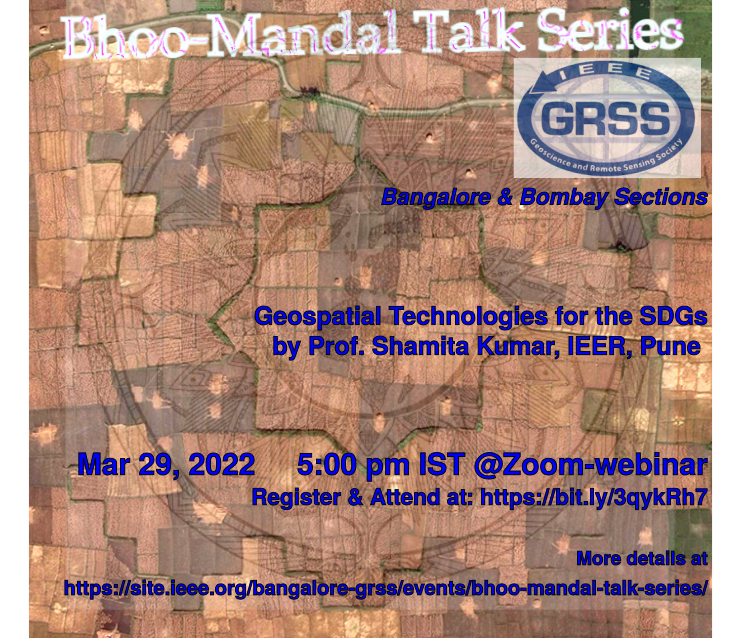Bhoo-Mandal Talk on March 29, 2022

Talk Title: Geospatial Technologies for the SDGs
Speaker: Prof. Shamita Kumar, Institute of Environment Education and Research (IEER), Pune
Time: March 29, 2022 (Tuesday) at 5 pm IST
Jointly organized by IEEE GRSS Bangalore and Bombay Sections
Venue: [Virtual talk on Zoom Webinar]
(Register for free and attend)
https://zoom.us/webinar/register/WN_B4lN0-hCRwyU4YYO49tHKg
Shortened link:
Abstract:
In 2015, the 2030 Agenda for Sustainable Development was adopted by the United Nations and its member states providing a global framework for action on sustainable development. Since then, several efforts are being made by member countries to contribute towards achieving the 17 Sustainable Development Goals (SDGs). In support of the measurement and monitoring of progress towards the 17 SDGs and the 169 associated targets, the UN has established a Global Indicator Framework and has designed 232 SDG Indicators. In order to progress towards the achievement of the SDG goals and targets, it is essential that this framework must capture the progress and aspirations of nations using evidence, drawn from accurate and robust data, on a continuous near real time basis.
The effective reporting of progress toward these indicators will require the use of multiple types of data, both what are being currently used- traditional national accounts, household surveys and routine administrative data – and new sources of data outside national statistical systems, earth observation data and geographical information using modern data processing techniques more appropriate to large volumes of EO data. The integration of all these data can produce a quantum leap in how we monitor and track development and advance the well-being of our societies. Integrated geospatial economic, social and environmental datasets are scarce for many countries, presenting an unrealised opportunity for space technology to play a key role in the global indicator framework.
Since Earth observation and geospatial information are often continuous in their spatial and temporal resolutions, their use in SDG monitoring can prove essential in capturing the sustainability of developments underpinning the SDG framework. They also have the potential to significantly reduce the costs of monitoring the aspirations reflected in the Goals and Targets, and make SDG monitoring and reporting viable within the limited resources available to governments. This talk will discuss the potential of using geospatial technologies in monitoring the progress on the SDGs and highlight areas of further research.
Speaker Biography:
Prof. Dr. Shamita Kumar is a landscape ecologist, geospatial technologist and environment educator. Presently Vice Principal and Professor at the Institute of Environment Education and Research, she is also a regular Guest Professor at the University of Cologne, Germany since 2013. Over the last twenty years she has implemented over twenty projects related to conservation, education for sustainability and geospatial technologies.
She is currently Member, National Geospatial Capacity Building Committee- Department of Science and Technology (DST), Government of India and has set up though the DST, a robust capacity building program in geospatial science and technology training till date more than 2000 in service professionals from government, academia, research and NGOs. 42 universities deliver these programs in a structured manner through the http:// dst-iget.in portal (which she and her team have set up supported by the DST). Currently her work in this field involves with using geospatial science and technology for achieving/monitoring the SDGs.
She is also Member, Executive Committee, Maharashtra State Forest Training Academy; Member – Geospatial Syllabus Committee IGNOU; Member, Academic Council, Bharati Vidyapeeth Deemed University. She is also an active member of the 4-country (South Africa, Mexico, Germany, India) ESD Expert Net since 2010. Currently she is the National Coordinator for this program through which she implements an Education for Sustainable Development Leadership Program in cooperation with Rhodes University, South Africa and vast outreach program in schools focusing on ‘Sustainability in Schools’.
Her research interests blend the science of conservation with technological tools and communication for sustainability and includes topics such as use of geospatial technologies for conservation, health planning, urban planning, peri-urban environmental issues, public participation in conservation, citizen science programs, ethno-ornithology and education for sustainable development. She has worked closely with the NCERT and several SCERTs across the country for environmentalising school textbooks across India. The research project headed by her and her team was the single force that resulted in environmentalisaiton of school textbooks across the country. She has been a crucial member of the team that has developed the Maharashtra State Biodiversity Strategy and Action Plan (2018-2028) to be implemented by the Maharashtra State Government .
Among her several awards are the prestigious Fullbright Scholarship by the US Government. She has been the recipient of the DAAD scholarship through the University of Cologne, Germany for five consecutive years.
Most of her work is interdisciplinary in nature blending the natural and social sciences. She believes that interdisciplinary research has the potential to develop new knowledge and there is a need to break down silos and work across subjects and academia
